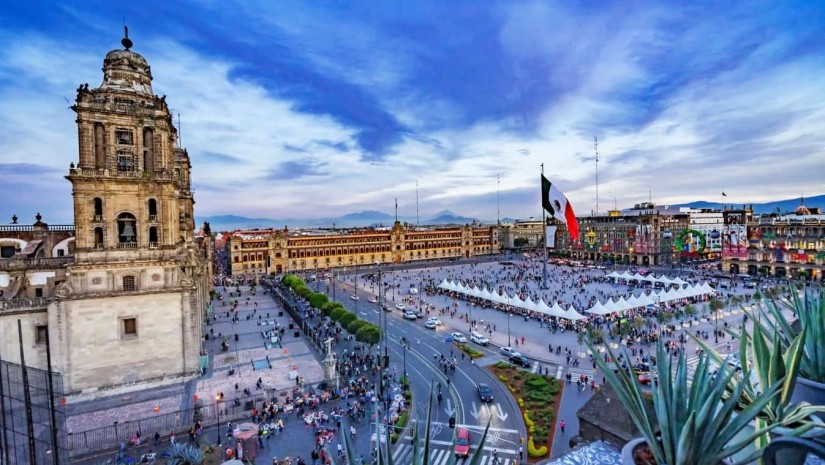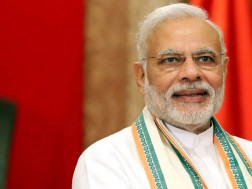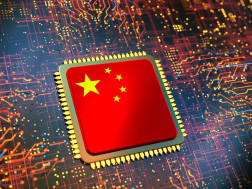The wall street community and indeed global investors increasingly search and debate who could be the big winners and losers of a potential Trump presidency 2.0. The iShares MSCI Mexico ETF (NYSEARCA:EWW) provides targeted exposure to a basket of leading Mexican companies and is currently trading at around USD 60 per share.
Mexico as a country increasingly plays a crucial role in the competition between the USA and China.
The 19th century Mexican dictator Porfirio Diaz famously quoted and opined, “Poor Mexico, So Far from God, So Close to the United States.”
With a strategic location, 12 free trade agreements and a talented young workforce, Mexico is one of the best places to do business in Latin America. While the people’s republic of China was often considered the factory of the world, Mexico is increasingly seen and perceived as the factory for America. Mexico real GDP growth is expected at 2% for 2024 and 1.8% for 2025 and 2% for 2026.
When looking at Mexico, the headlines often end up unfavourable in terms of persistent challenges in dealing with local crime and public safety, or Mexican local political scandals. That being said, the key for global investors should be to focus on the hard economic data, which appears to have at least evolved more favourably compared to a low base of expectations.
By strengthening economic ties with Mexico, the US can work towards balancing its trade deficit with Mr. Xi’ People’s Republic of China. Increasing trade with Mexico helps the US reduce its reliance on Chinese imports and fosters a more balanced trade relationship.
Mexico's importance in the competition between the USA and China lies in its ability to provide a stable, cost-effective, and strategically located alternative for manufacturing and trade. This helps the US mitigate risks, diversify supply chains, and enhance economic security.
Many US companies have relocated or expanded their manufacturing operations to Mexico as part of a strategy known as "nearshoring." This shift helps companies reduce their dependence on Chinese manufacturing and mitigate risks associated with long supply chains, such as tariffs, trade tensions, and disruptions.
The United States-Mexico-Canada Agreement (USMCA) strengthens economic ties between the US and Mexico, making it easier for companies to trade and invest across borders. This agreement has facilitated increased economic integration and made Mexico a more attractive partner for US businesses.
Mexico has abundant natural resources, including oil and gas, which are critical for energy-intensive industries. The availability of these resources supports industrial growth and provides an additional incentive for investment.
J.P. Morgan Chase CEO Jamie Dimon opined that in his opinion Mexico is one the best countries to invest in. Mr. Dimon highlighted the country's economic stability, favourable demographics, and proximity to the United States as key factors making it an attractive destination for investment. He emphasized the opportunities in various sectors, including manufacturing, technology, and energy, and expressed confidence in Mexico's potential for growth and development.
An article by Bloomberg titled "Jamie Dimon Says Mexico Best Country to Invest In" published on July 7, 2023. This article provides details on Dimon's comments and the context in which they were made.
Although Mexico is not one of the most competitive countries in the world, Mexico is the second Latin American most competitive economy according to the World Economic Forum (WEF) and the World Bank (WB).
According to a recent World Investment Report of the United Nations Conference on Trade and Development (UNCTAD), Mexico is one of the top developing nations in which to invest.
EWW, the iShares Mexico ETF on the New York Stock Exchange and the closing price on 07/10/24 was USD 60.29. the ETF’s objective seeks to provide the investment results that correspond to the performance of the MSCI IMI 25/50 index. The ETF is currency unhedged and passively managed.
Currently, the ETF is trading below the 200-day moving average yearly trendline and the 5-year total return stands at +55%. Year-to-date the Mexico ETF has underperformed the USA S&P500 index ETF SPY by -27.58%.
As of 2023, Mexico ranks as one of the top trade partners of the United States. It has consistently been in the top three, often alternating between the first and second positions with Canada and China. Mexico's strong trade relationship with the U.S. is primarily driven by the United States-Mexico-Canada Agreement (USMCA), which has facilitated robust trade flows across various sectors, including automotive, electronics, agriculture, and energy.
Mexico's proximity to the United States, the world's largest economy, provides significant advantages for trade and investment. The country serves as a gateway to both North and South American markets and as such is of increasing interest to China and Chinese companies too.
Should Mr. Trump win the 2024 presidential election, the current consensus view among investors and policy makers is that a trump administration could get tough on both China and Mexico.
For Mexico, more broadly, the relationship is expected to be less comfortable with Trump's focus on border controls potentially hurting longer-term growth of remittances.
China Southern Airlines inaugurate its new direct flight route from Shenzhen to Mexico City on May 11, marking a significant milestone in air travel between China and Latin America.
The Shenzhen-Mexico City route will also mark China Southern's first direct flight to Latin America, and will be China's longest direct international flight route, as well as the only direct passenger flight route to Mexico and Latin America from the Chinese mainland.
Mexico plays a crucial role in the competition between the USA and China.
Mexico offers competitive labour costs, which makes it an appealing alternative to China for manufacturing. The cost advantages, combined with skilled labour, enhance Mexico's attractiveness for companies looking to diversify their production bases.
Mexico has numerous free trade agreements with over 50 countries, including the USMCA (United States-Mexico-Canada Agreement), which replaced NAFTA. This network of agreements provides preferential access to many international markets.
Mexico has demonstrated relatively stable economic growth over the past decades. Its macroeconomic policies, including inflation targeting and a floating exchange rate, have contributed to economic stability.
Mexico has a large and growing middle class, leading to increasing domestic consumption. This growing market offers opportunities in retail, consumer goods, real estate, and services.
Mexico is one of the world's top tourist destinations, attracting millions of visitors each year. This creates opportunities in the tourism and hospitality industries. Mexico is investing in infrastructure development, including transportation, telecommunications, and energy. Improved infrastructure enhances the country's attractiveness for investment.
Mexico is increasingly focusing on innovation and technology. The country has several tech hubs and is promoting entrepreneurship and the startup ecosystem. The Mexican government offers various incentives to attract foreign investment, including tax breaks, grants, and support for research and development.
The legal system in Mexico can sometimes be inconsistent, and corruption or facilitated payments remains a concern. Investors might face difficulties in enforcing contracts, protecting intellectual property, and navigating legal disputes.
Investing in Mexico, like any other country, comes with risks, such as political and economic uncertainties, regulatory challenges, and security issues in certain areas. It's essential for investors to conduct thorough research and consider both the opportunities and risks before making investment decisions.
The current President of Mexico is Andrés Manuel López Obrador (AMLO), who has been in office since December 1, 2018. There has been speculation about Claudia Sheinbaum being a potential candidate for the presidency in future elections. Claudia Sheinbaum, a prominent Mexican politician from the National Regeneration Movement (MORENA) party, has been a significant figure in Mexican politics, serving as the Mayor of Mexico City from 2018 to 2023. As with any political figure, her policies and leadership style can introduce certain risks for investors.
As a member of the MORENA party, Sheinbaum's policies might align with the broader political agenda of the party, which can sometimes prioritize social and economic reforms over business-friendly measures. Changes in policies related to business regulations, taxation, and labour laws could impact the investment climate.
While Sheinbaum has been recognized for her leadership in Mexico City, her potential ascent to higher political office could bring both opportunities and risks. Investors may need to monitor how her governance style and policy priorities translate at the national level, particularly if she seeks a larger role in Mexican politics. Sheinbaum has shown a strong commitment to social and environmental issues, including sustainability and public transportation. While these policies can improve the quality of life and create new business opportunities, they may also impose additional regulations and costs on certain industries.
Economic policies and management under Sheinbaum’s leadership could impact economic growth, inflation, and fiscal stability. Investors should consider how her approach to economic challenges aligns with their business interests.
Investors are encouraged to conduct thorough due diligence, seek professional advice, and consider their risk tolerance before making any investment decision in Mexico or in a portfolio context. Past performance is not indicative of future results, and investments can lose value. This article is for informational purposes only and does not constitute investment advice or an endorsement of any investment strategy.
Rainer Michael Preiss is Partner & Portfolio Strategist at Das Family Office in Singapore
















